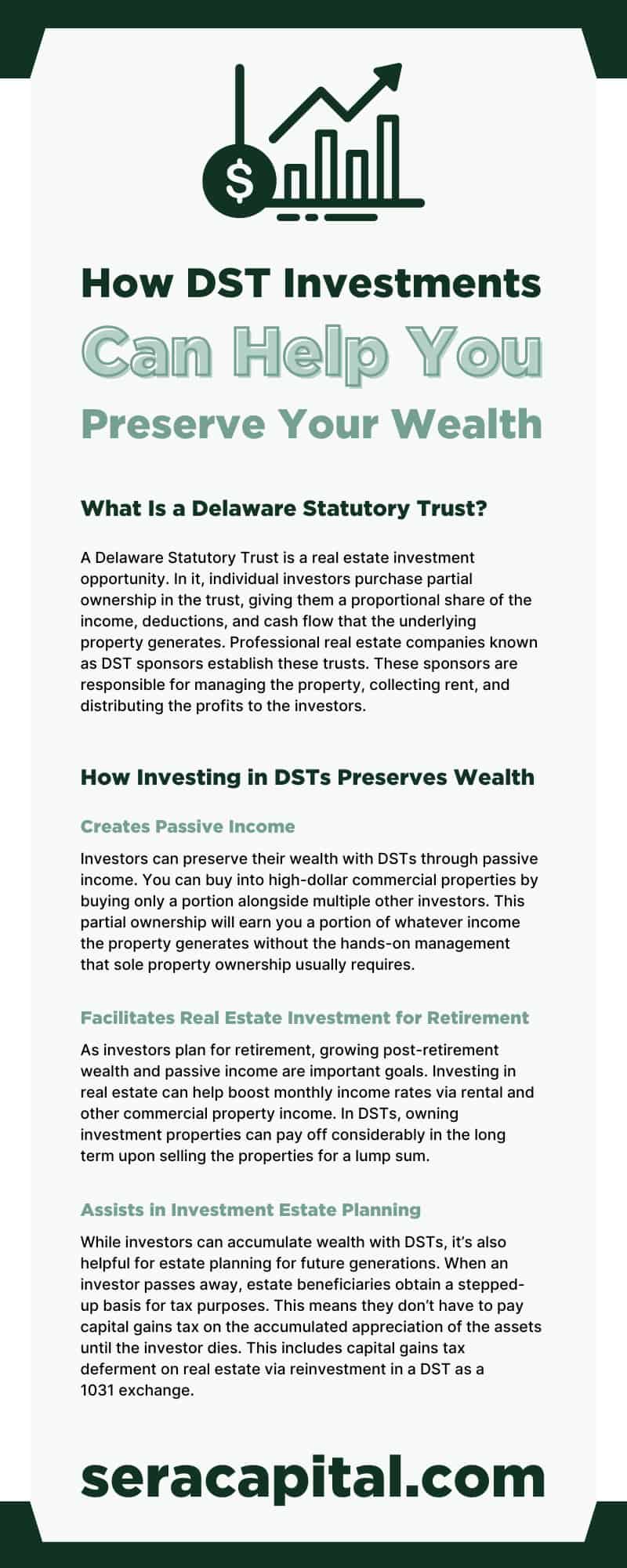How DST Investments Can Help You Preserve Your Wealth

Carl E. Sera, CMT
May 25, 2023
Building a retirement with passive income can be a challenging endeavor, especially if you’re not sure which avenue to take. Luckily, Delaware Statutory Trusts (DSTs) create a means of passive income while allowing estate planning for the investor. Read on to learn more about how DST investments can help preserve wealth through passive income.
What Is a Delaware Statutory Trust?
A Delaware Statutory Trust is a real estate investment opportunity. In it, individual investors purchase partial ownership in the trust, giving them a proportional share of the income, deductions, and cash flow that the underlying property generates. Professional real estate companies known as DST sponsors establish these trusts. These sponsors are responsible for managing the property, collecting rent, and distributing the profits to the investors.
It is important to note that many DSTs require a minimum investment of $100,000. However, though this is a significant upfront cost, the resulting hands-off income makes the investment opportunity well worthwhile for many people. Furthermore, because DSTs rely on multiple investors, the value of a DST property is often high, likely resulting in high returns.
Types of Delaware Statutory Trusts
So which DST best suits you and your financial goals? Furthermore, what should investors look for in DST properties? While the DST market changes daily, tracking shows that many types of DSTs are always available, while others have only occasional availability. Also, many DSTs have leverage, meaning they have a mortgage on the properties in a deal. Therefore, each investor would have a share in the debt.
Given these variables, you’ll have to investigate the particulars of each DST you’re interested in. To get you started, some of the common types of DST deals that you could partake in include the following:
- Industrial DSTs
- Apartment or multi-family DSTs
- Hotel DSTs
- Assisted living DSTs
- Oil and gas DSTs
- Portfolio DSTs
- Self-storage DSTs
- Medical office DSTs
Main DST Benefits
Delaware Statutory Trusts offer numerous benefits to investors, including eligibility for 1031 exchanges, income potential, tax benefits, institutional-quality asset ownership opportunities, and more. DSTs create opportunities to sell appreciated assets that help defer capital gains taxes, allowing the opportunity to maintain and build wealth. This is especially true when you invest in a DST via a 1031 exchange.
DSTs create greater income potential and tax-saving opportunities for estate beneficiaries. DSTs have a structure of creating cash flow by acquiring high-quality institutional properties in rapidly growing cities. As a result, DST sponsors seek to preserve greater income potential and investment value for investors.
Additionally, DSTs provide estate planning benefits through deferred capital gains tax, net investment income tax, and depreciation recapture upon the passing of an owner. Estates can also seamlessly divide DST investments among beneficiaries.
Delaware Statutory Trusts and 1031 Exchanges
1031 exchanges—originating from Section 1031 of the US Internal Revenue Code—are IRS-approved transactions permitting real estate investors to defer capital gains tax or tax liability on investment property sales. Delaware Statutory Trusts qualify for direct property ownership for tax purposes, thus making them eligible for 1031 exchange tax deferment.
1031 exchanges defer taxes on relinquished property sale proceeds if the investor uses the money to invest in another property of equal or greater value within 180 days of the closing date. This tax deferral permits DST investors to preserve equity from the relinquished property sale so it continues working for them in their new DST property replacement.
How Investing in DSTs Preserves Wealth
You already have an idea of how DSTs generate and protect wealth, but let’s review the specifics of how DSTs help preserve an investor’s wealth. Below are the various ways Delaware Statutory Trusts can aid in preserving wealth and accumulating it beyond the owner’s passing and onto their future family.
Creates Passive Income
Investors can preserve their wealth with DSTs through passive income. You can buy into high-dollar commercial properties by buying only a portion alongside multiple other investors. This partial ownership will earn you a portion of whatever income the property generates without the hands-on management that sole property ownership usually requires. Instead, DST sponsors buy the properties, structure them into DSTs, and handle the daily property management duties while distributing gains to the investors.
Facilitates Real Estate Investment for Retirement
As investors plan for retirement, growing post-retirement wealth and passive income are important goals. Investing in real estate can help boost monthly income rates via rental and other commercial property income. In DSTs, owning investment properties can pay off considerably in the long term upon selling the properties for a lump sum.
Then, investors can invest the proceeds in additional properties or trust funds, leaving behind a financial legacy for their families and loved ones. Furthermore, investors should evaluate their property before retirement, especially if they have borrowed funds to acquire the property. Investors should pay attention to the property’s location, the property’s projected profit, and the property type.
Assists in Investment Estate Planning
While investors can accumulate wealth with DSTs, it’s also helpful for estate planning for future generations. When an investor passes away, estate beneficiaries obtain a stepped-up basis for tax purposes. This means they don’t have to pay capital gains tax on the accumulated appreciation of the assets until the investor dies. This includes capital gains tax deferment on real estate via reinvestment in a DST as a 1031 exchange.
As DST beneficiaries sell their assets, a stepped-up basis occurs in the value at the date of the investor’s death. While the inherited property can defer capital gains tax, DST assets still form part of the investor’s estate, meaning the typical estate tax exclusions and rules still apply. Therefore, it’s crucial for investors to speak to an estate planning professional to help determine how DST investment can impact their estate and how they can avoid certain risks.
If you want to plan your retirement or establish generational wealth, we at Sera Capital can help with your real estate investments. Our team of professional fee-only fiduciaries offers their expertise in real estate investment avenues to individuals owning highly appreciated assets. Our Delaware Statutory Trust 1031 exchange services perfectly suit investors looking to loosen their real estate responsibilities and holdings without paying hefty taxes. For more information about our fiduciaries, schedule a free 20-minute phone call with us today!

Categories
Strategize Your Success
